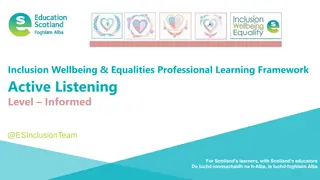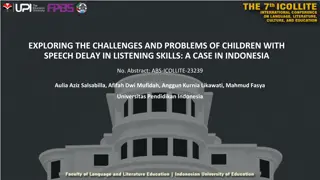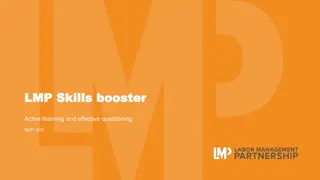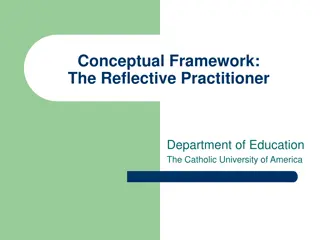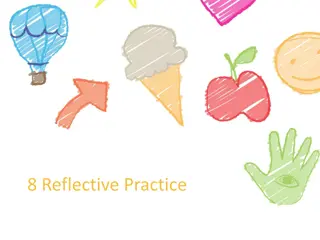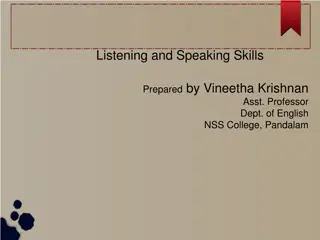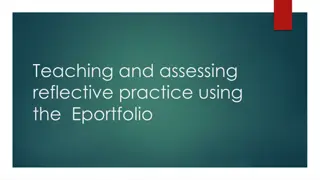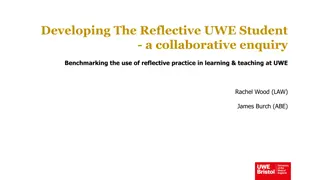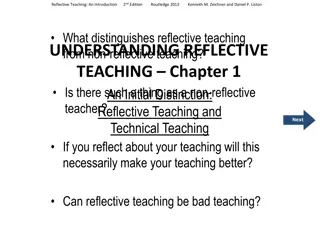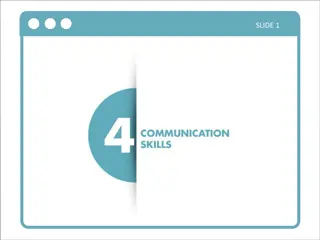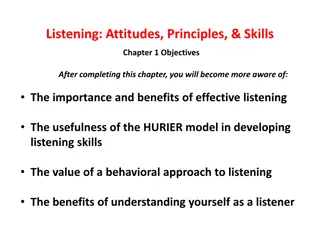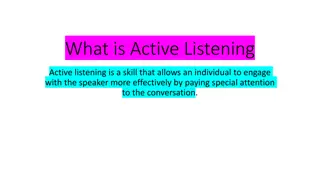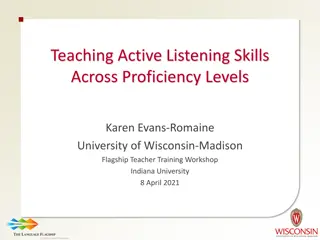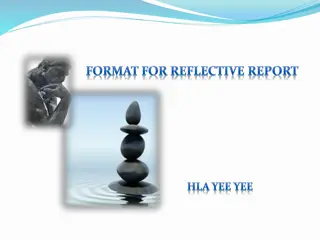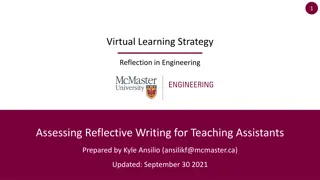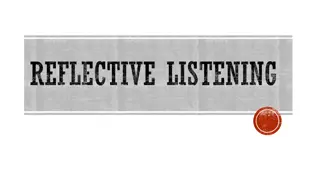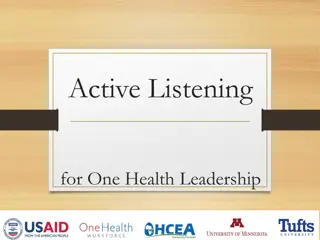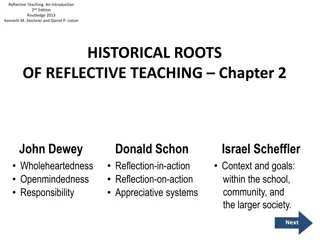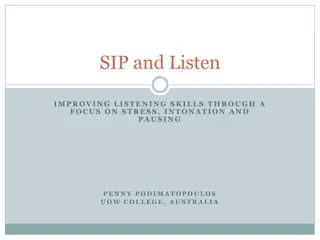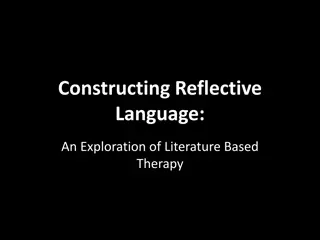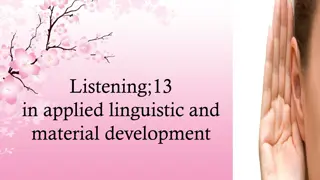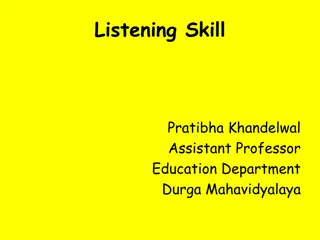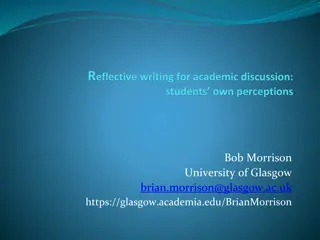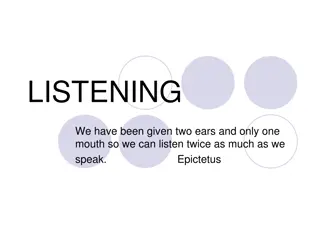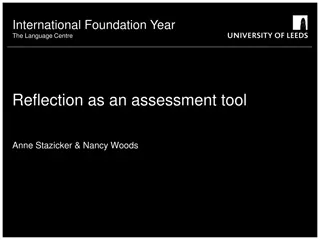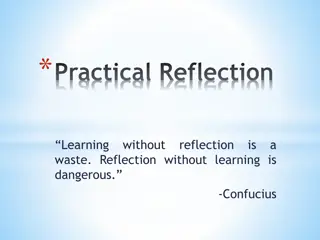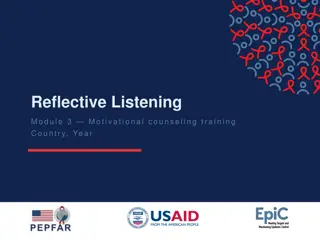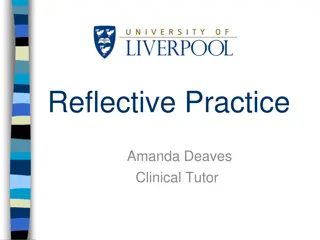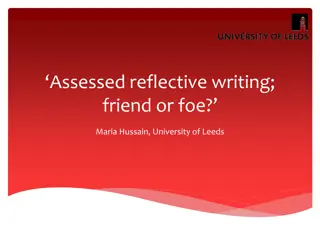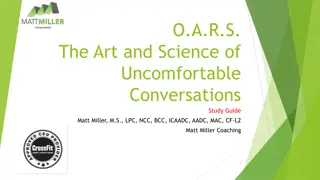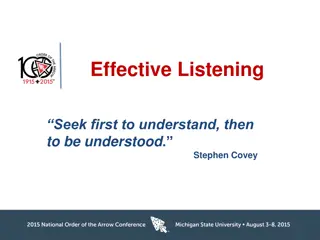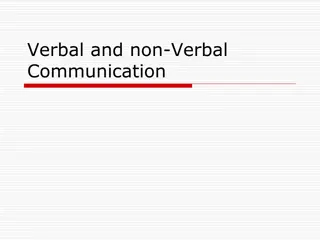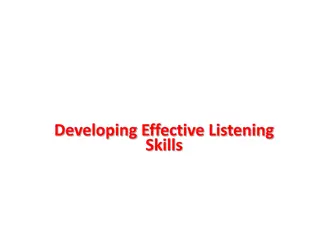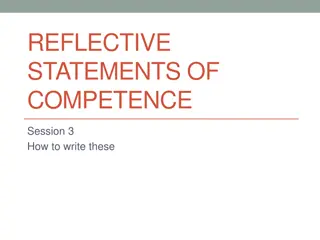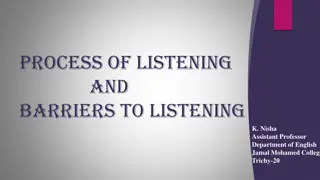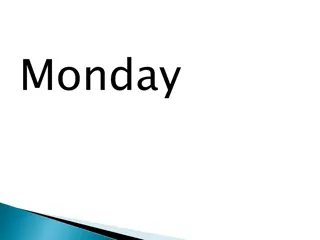Enhancing Professional Learning Through Active Listening Framework
Explore a comprehensive professional learning resource focusing on inclusion, wellbeing, and equalities for Scotland's educators and learners. The resource includes slides on active listening, interconnectivity, and guidance on how to utilize the material effectively. Dive into the National Model fo
11 views • 24 slides
Understanding Challenges Faced by Children with Speech Delay in Listening Skills: A Case Study in Indonesia
Speech delay can hinder a child's ability to develop language skills, impacting areas such as listening, attention, and socialization. In Indonesia, 20% of children face speech delay, posing challenges in listening and language production. This study delves into the difficulties encountered by child
7 views • 10 slides
Enhancing Communication Skills Through Active Listening and Effective Questioning
Explore the importance of active listening and effective questioning in communication. Learn strategies to show you're listening, even virtually. Discover the benefits of an active listening mindset and how to overcome barriers to listening effectively in various environments.
4 views • 33 slides
Exploring Personal Reflective Writing Through Two Engaging Passages
Personal reflective writing involves exploring your reactions to events or experiences, delving into your thoughts and emotions to provide a unique perspective. This form of writing goes beyond mere storytelling and requires genuine reflection and introspection to create engaging and authentic narra
0 views • 39 slides
Exploring Reflective Practice in Education: A Conceptual Framework
Delve into the concept of reflective practice within the field of education through the reflective practitioner framework at The Catholic University of America's Department of Education. Understand how reflective practitioners consider the consequences of educational decisions for constant refinemen
1 views • 30 slides
Enhancing Professional Practice through Reflective Practice
Reflective practice is an essential ongoing process in professional practice with children and families. It involves honest, deep, and critical thinking to improve outcomes, challenge assumptions, and seek collaboration. Through reflective practice, educators can recognize good practices, address ch
0 views • 35 slides
Enhancing Listening and Speaking Skills: A Comprehensive Guide
Explore the significance of listening skills in professional and personal settings, understand the difference between listening and hearing, learn the essential components of the listening process, identify common problems and barriers to effective listening, and discover strategies to overcome thes
3 views • 20 slides
Enhancing Reflective Practice Using Eportfolios
Reflective practice is a metacognitive process crucial for self-understanding and future action. Utilizing Eportfolios in teaching and assessing reflection helps trainees develop critical thinking skills. The session plan includes discussion on educator comments, exploring Eportfolios, and strategie
0 views • 16 slides
Exploring Reflective Practice in Learning & Teaching at UWE
The collaborative enquiry at UWE delves into the use of reflective practice in various professional courses, highlighting challenges and the importance of reflective capacity. A diverse group engages in iterative cycles of input, conversation, reflection, and refreshments to benchmark and enhance re
0 views • 15 slides
Understanding Reflective Teaching: An Introduction
Reflective teaching involves actively questioning educational goals, classroom contexts, and personal assumptions. It encourages teachers to play leadership roles in curriculum development and school reform. The movement towards reflective practice rejects top-down educational reform, emphasizing te
0 views • 9 slides
Effective Communication and Listening Skills for Children
Effective communication and listening skills are crucial when working with children who have experienced violence or are at risk. By practicing good listening techniques and using appropriate communication approaches, you can make survivors feel more comfortable and believed. Active and positive lis
5 views • 8 slides
Enhancing Listening Skills: Understanding Principles and Applying the HURIER Model
This content covers the importance, benefits, and skills of effective listening, highlighting the HURIER model, behavioral approach, and self-awareness. It discusses the tasks and relationship functions in listening, goals of effective listening, components of the HURIER model, and ways to apply it
2 views • 10 slides
Enhancing Communication: The Power of Active Listening
Active listening is a crucial skill that involves giving undivided attention to the speaker, understanding, and responding appropriately. By focusing on the speaker, using body language to show engagement, and practicing empathy, one can become a more effective listener. The principles of effective
2 views • 7 slides
Enhancing Listening Skills in Language Teaching: Strategies and Challenges
Explore the challenges and strategies for improving listening skills across proficiency levels in language teaching. From decoding word borders to applying background knowledge, discover ways to enhance listening comprehension for learners. Gain insights into micro and macro skills that contribute t
1 views • 42 slides
Exploring Reflective Written Assignments in Statistics Courses
Introducing reflective written assignments in a statistics course can be beneficial for students, as shown by research on the impact of guided reflections. By incorporating reflective tasks alongside traditional assessments, students can enhance their transferable skills and improve their ability to
0 views • 36 slides
Benefits of Reflective Practice and Critical Reflection Models
Reflective practice is essential for deep learning and personal growth. This content explores the benefits of reflective practice, including increased learning, identifying strengths and areas for improvement, and acquiring new knowledge. It also introduces the DEAL model for critical reflection, em
0 views • 20 slides
Enhancing Reflective Writing in Engineering: A Guide for Students and Teaching Assistants
This course module series aims to improve reflective writing skills for engineering students, teaching assistants, and instructors. It covers the definition of reflection, its importance in learning and professional development, and practical strategies for effective written reflection. The content
0 views • 36 slides
Enhancing Communication Through Reflective Listening Techniques
The Reflective Listening process fosters effective communication by showing understanding, providing feedback, and guiding emotional expression. Skills like attending and reflective skills, as well as non-verbal cues like eye contact and gestures, play a crucial role. Silence can also be a powerful
0 views • 11 slides
Enhancing One Health Leadership Through Active Listening
Explore the importance of active listening in One Health leadership, focusing on techniques such as reflecting, paraphrasing, and repeating. Discover the differences between dialogue and debate, and learn about the listening spectrum. Engage in exercises to deepen listening skills and communication
0 views • 15 slides
Enhancing Listening Skills for Effective Feedback
Explore the importance of listening in providing and receiving feedback, embodying the concept of 'emptying your cup' to truly absorb information. Engage in activities to practice active listening, watch informative videos, and delve into the Four Levels of Listening to deepen your understanding and
0 views • 16 slides
Historical Roots of Reflective Teaching: Dewey and Schon's Perspectives
This content discusses the historical roots of reflective teaching, focusing on the contributions of John Dewey and Donald Schon. Dewey emphasized open-mindedness, wholeheartedness, and responsibility as integral to reflective action, while Schon introduced the concepts of reflection-on-action and r
0 views • 6 slides
Enhancing Listening Skills Through Stress, Intonation, and Pausing
Explores the impact of stress, intonation, and pausing on improving listening skills among EAP students. Students reported increased confidence, transfer of strategies, and enhanced control in listening activities. Specific activities focused on SIP showed significant benefits, making listening prac
0 views • 12 slides
Diving into Reflective Language: A Journey through Literature-Based Therapy
Explore the power of reflective language in literature-based therapy through thought-provoking quotes from authors like Stephen King, Chimamanda Ngozi Adiche, and Audre Lorde. Discover how stories can empower and humanize, providing new perspectives and shared experiences to enhance one's vocabulary
0 views • 7 slides
Understanding the Role of Listening in ELT Curriculum
The role of listening in ELT curriculum is crucial as it involves receptive skills and cognitive processes like decoding. Research shows listening comprises 45% of communication engagement, highlighting its importance. Listening is not just hearing; it challenges learners with various language modes
0 views • 49 slides
Enhancing Listening Skills in Education
Listening is a critical skill that involves receiving, interpreting, and responding to messages. It comprises components like hearing, attending, interpreting, evaluating, remembering, and responding. Different from hearing, listening is purposeful, interactive, psychological, and involves active pa
0 views • 20 slides
Enhancing Academic Discussion Through Reflective Writing
Explore the process of reflective writing for academic discussions, focusing on students' perceptions and guided reflections. The course structure, purpose, and key aspects of reflective writing are discussed, offering insights on improving academic discussion skills. Dive into meaning-making proces
0 views • 19 slides
Enhancing Listening Skills: Techniques and Activities
Explore the various facets of listening, from basic definitions like hearing and understanding to more specialized forms such as critical, discriminative, therapeutic, and appreciative listening. Engage in comprehensive and critical listening activities to sharpen your skills, learn to listen with a
0 views • 12 slides
Enhancing Foundation Year Student Skills Through Reflective Assessment
This comprehensive study explores the challenges in teaching Foundation Year students and introduces a reflective assessment tool to enhance critical thinking, autonomy, and academic skills. The initiative involved implementing a reflective journal task, assessing student progress, and encouraging s
0 views • 15 slides
Enhancing Learning Through Reflective Practices: A Comprehensive Guide
Explore the significance of reflection in professional development, understanding various reflective practices, and engaging in activities to foster individual and group reflection. Discover the dynamics of cyclical learning, the cognitive and affective aspects of reflection, frameworks for improvem
0 views • 12 slides
Understanding Reflective Listening Techniques in Motivational Counseling Training
Reflective listening involves active listening, observing, and interpreting verbal and nonverbal cues to understand the speaker's thoughts and feelings. It includes levels of reflection such as simple rephrasing, complex paraphrasing, reflection of feeling, double-sided reflection, and summarizing t
0 views • 15 slides
Understanding Reflective Practice in Physiotherapy
Increase knowledge of reflective practice, review reflection models, grasp critical reflection's role in clinical placement, comprehend reflection's significance in physiotherapy practice, and prepare for assignments. Definitions of reflective practice, reasons for reflection, CSP expectations, deve
0 views • 27 slides
Exploring the Value of Reflective Writing in Academic Development
Reflective writing plays a crucial role in enhancing learning experiences by encouraging learners to critically examine their thoughts and decisions. This assessment discusses the potential of reflective writing in academic settings, identifies barriers to its full engagement, and presents practical
0 views • 25 slides
Mastering Uncomfortable Conversations: O.A.R.S. Study Guide by Matt Miller, M.S., LPC, NCC
Discover the foundational principles of Motivational Interviewing with OARS, focusing on Open-ended Questions, Affirmations, Reflective Listening, and Summarizing. Learn how to engage clients effectively through genuine communication skills, positive reinforcements, and reflective listening to build
0 views • 28 slides
Enhancing Communication Skills Through Effective Listening and Leadership
Discover the art of effective listening, a crucial skill for building relationships, developing teams, and finding solutions. Dive into the concepts of active and empathetic listening, and explore how listening can transform adversarial situations into positive outcomes. Uncover the principles of se
0 views • 11 slides
Understanding Verbal and Non-Verbal Communication
Verbal communication involves both speaking and listening, with listening being equally essential. It can be classified into sympathetic and empathetic listening, each serving different purposes in understanding others' feelings. Sympathetic listening involves sharing emotions, while empathetic list
0 views • 52 slides
Mastering the Art of Effective Listening Skills
Enhance your listening skills by understanding the difference between listening and hearing, learning various types of listening, identifying causes of poor listening, and implementing techniques to improve your ability to listen effectively. Discover why listening is crucial, how it can de-escalate
0 views • 22 slides
Enhancing One Health Leadership Through Active Listening
Explore the techniques and importance of active listening in One Health leadership. Understand the differences between dialogue and debate, delve into the listening spectrum, learn active listening techniques, and participate in an exercise to deepen your listening skills.
0 views • 15 slides
Reflective Statements of Competence: Writing Guidelines and Examples
Explore how to write reflective statements of competence for teaching practices, focusing on the CDA Competency Standards. Learn about structuring competency goal statements and functional areas, with detailed examples included. Enhance your understanding of creating a safe, healthy learning environ
0 views • 13 slides
Understanding the Process of Listening and Overcoming Barriers
The process of listening involves stages like receiving, understanding, interpreting, evaluating, and responding. Ways to enhance listening skills include being attentive, keeping an open mind, and providing regular feedback. Barriers to listening, such as distractions, can hinder effective communic
0 views • 14 slides
Understanding Effective Communication Through Poor Listening Styles
Exploring the concept of empathy through the quote "Before I can walk in another's shoes, I must first remove my own." This is followed by details on assignments due, reading tasks, and Habit #5 from the book "The 7 Habits of Highly Effective Teens." The summary also delves into various poor listeni
0 views • 49 slides
